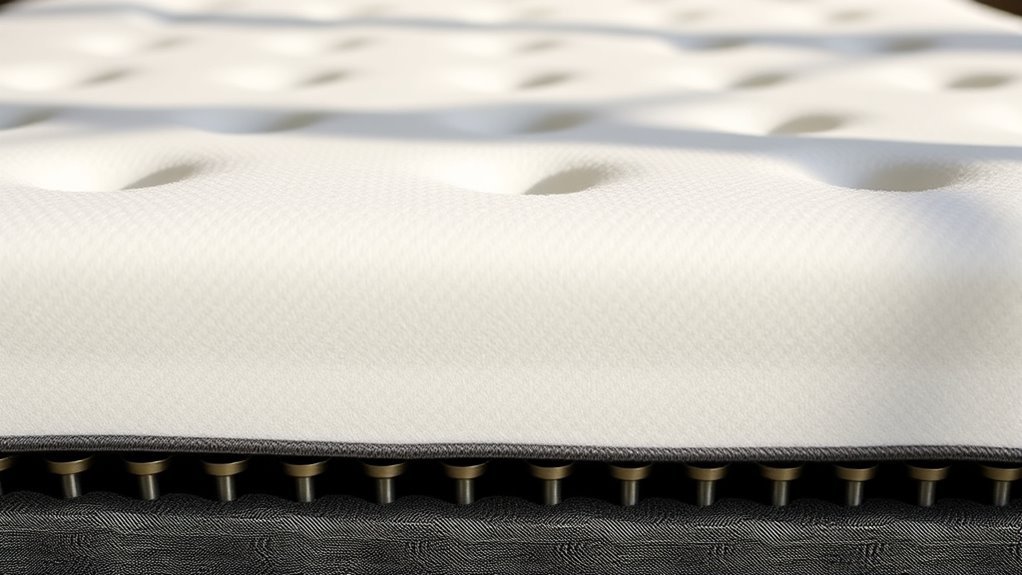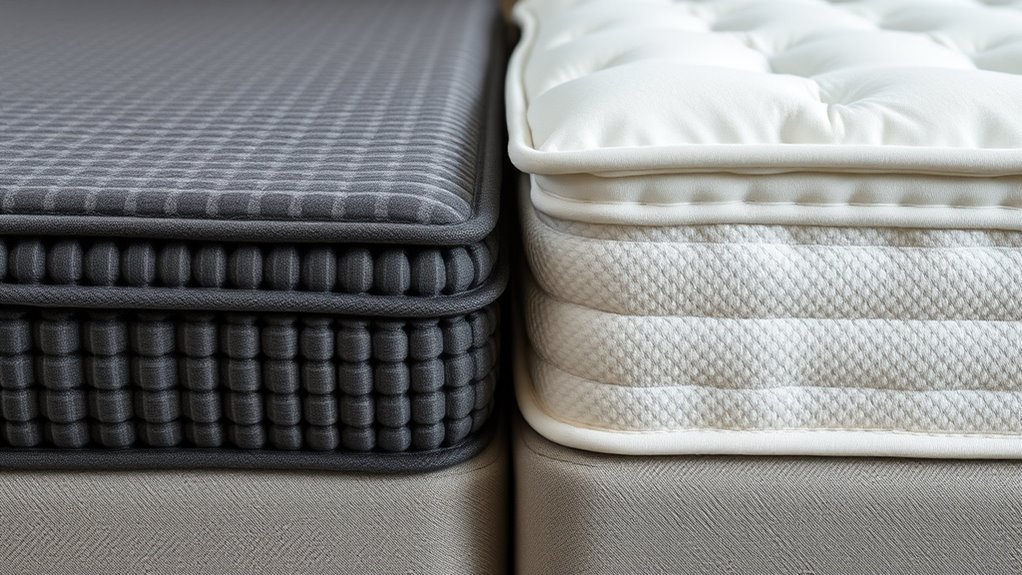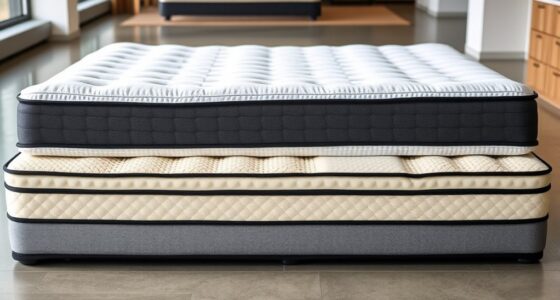Firmness refers to how hard or soft a mattress feels when you lie on it, while support describes how well the mattress maintains proper spinal alignment and evenly distributes body weight. A mattress can feel soft but still provide solid support if it contours to your body. Conversely, a firm mattress may lack enough support if it doesn’t cushion pressure points. Understanding the difference helps you pick the right mattress. Keep exploring to find out how to balance both for better sleep.
Key Takeaways
- Firmness describes the initial feel of a mattress (hard or soft), while support refers to how well it maintains proper spinal alignment.
- Support ensures even weight distribution and contouring to body curves, preventing pressure points and discomfort.
- A mattress can be firm but poorly supportive if it doesn’t contour, or soft but supportive if designed to distribute weight properly.
- Proper support promotes healthy posture and reduces aches, regardless of the mattress’s firmness level.
- Balancing firmness and support is crucial for comfort, reducing tossing, and achieving restorative sleep.

Have you ever wondered what really makes a mattress comfortable—firmness or support? The truth is, both play essential roles, but understanding how they interact can help you find the perfect sleep surface. When you lie down, your body’s weight presses against the mattress, and if it doesn’t distribute evenly, you might wake up with aches or stiffness. That’s where support comes into play. A supportive mattress aligns your spine properly, ensuring your body maintains a natural posture throughout the night. Proper spinal alignment reduces strain on your muscles and joints, preventing those nagging aches that can ruin your morning.
Support isn’t just about feeling firm; it’s about how well the mattress adjusts to your body’s contours, especially around pressure points—areas like your hips, shoulders, and lower back. These are the spots most affected by poor support, often causing discomfort and restless sleep. A mattress that offers good support relieves pressure points by evenly distributing your body weight, preventing those painful pinches and tightness. When support is optimized, your spine stays in a neutral position, which is essential for restorative sleep. Without it, you risk developing misalignments that can lead to long-term discomfort or even exacerbate existing back problems.
Firmness influences how hard or soft you perceive your mattress to be, but it’s not the sole factor in comfort. A mattress can be firm yet supportive if it’s designed to contour to your body, or it can be soft but lack adequate support, leading to sagging and misalignment. Think of firmness as the initial feel, but support as the underlying structure that maintains proper form and function. If a mattress is too firm, it might create pressure points, especially around bony areas, causing discomfort. Conversely, if it’s too soft, it might not provide enough support, allowing your body to sink excessively and disrupting spinal alignment.
Choosing the right balance depends on your body type and sleeping position. For example, side sleepers often benefit from a slightly softer surface that cushions pressure points, while back sleepers may prefer a firmer support to keep the spine aligned. Ultimately, the goal is to find a mattress that offers enough firmness to support your body’s weight while simultaneously relieving pressure points. When these elements work together, you’ll experience less tossing and turning, waking up refreshed, free from pain, and ready to face the day. Remember, the best mattress is one that supports your unique body needs, ensuring your spine stays aligned and pressure points are minimized. Additionally, AI security advancements can help protect your personal data when shopping online for the perfect mattress.
Frequently Asked Questions
How Do Firmness and Support Affect Sleep Quality?
Your sleep comfort depends heavily on how your mattress’s firmness and support work together. Proper support helps keep your spine aligned, reducing aches and improving sleep quality, while the right firmness ensures comfort for your preferred sleep position. When these factors are balanced, your mattress feels durable, maintaining its support over time. This combination makes your sleep more restful and helps prolong mattress durability, guaranteeing better sleep night after night.
Can the Wrong Firmness Cause Back Pain?
Imagine trying to sit on a chair that’s too hard or too soft; discomfort is inevitable. Similarly, choosing the wrong firmness can cause back pain because it doesn’t provide proper support or contour to your spine. Firmness customization is key for back pain prevention, ensuring your mattress suits your body’s needs. When your mattress matches your firmness preference, you’re more likely to wake up pain-free and refreshed.
Are There Specific Mattress Types for Different Sleep Positions?
You’ll find that different sleep postures benefit from specific mattress types, which can be seen as mattress customization for comfort and support. Side sleepers often prefer softer mattresses to cushion shoulders and hips, while back and stomach sleepers usually need firmer options to maintain proper spinal alignment. Choosing the right mattress based on your sleep posture helps you wake up feeling refreshed and reduces discomfort, making your sleep more restorative.
How Often Should I Replace My Mattress for Optimal Support?
You should replace your mattress every 7 to 10 years to maintain ideal support and comfort. Over time, its mattress lifespan diminishes as the materials wear out, leading to sagging and reduced support. Sticking to a regular replacement schedule helps prevent discomfort and potential health issues caused by an unsupportive mattress. Pay attention to signs like sagging, uneven surfaces, or discomfort to know when it’s time for a new one.
Do Firmness and Support Influence Allergy Concerns?
You might wonder if mattress firmness and support affect allergy concerns. For example, if you choose a firm mattress made from hypoallergenic materials, it can reduce allergy triggers like dust mites. Proper support prevents sagging, which can trap allergens. So, selecting a supportive, firm mattress with hypoallergenic features helps minimize allergy issues, making your sleep healthier and more comfortable.
Conclusion
Think of your mattress as a trusted dance partner—firmness is your bold, confident step, while support is the steady rhythm guiding you. When both move in harmony, you’ll glide through your nights with comfort and ease. Remember, finding the right balance turns your sleep into a graceful dance, where every movement feels natural and revitalizing. So, choose your mattress wisely, and let it be the steady partner that keeps you dancing happily through your dreams.









